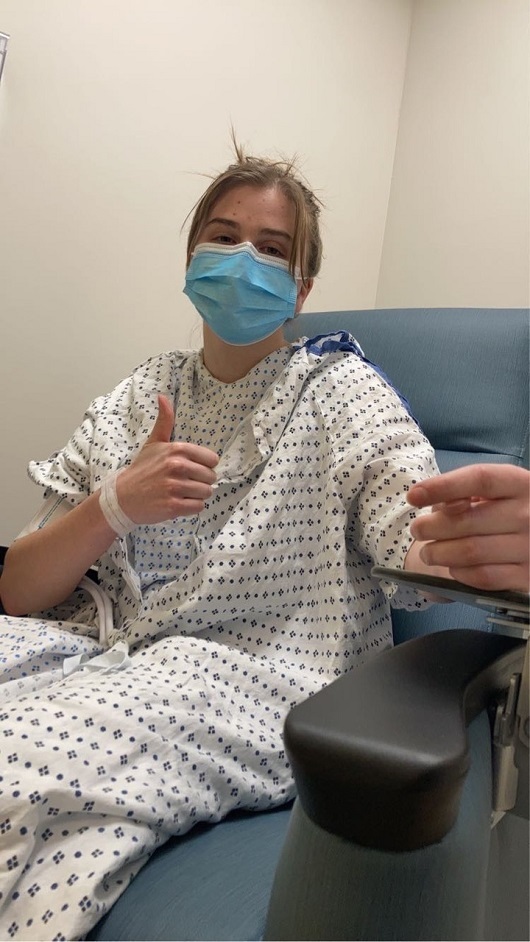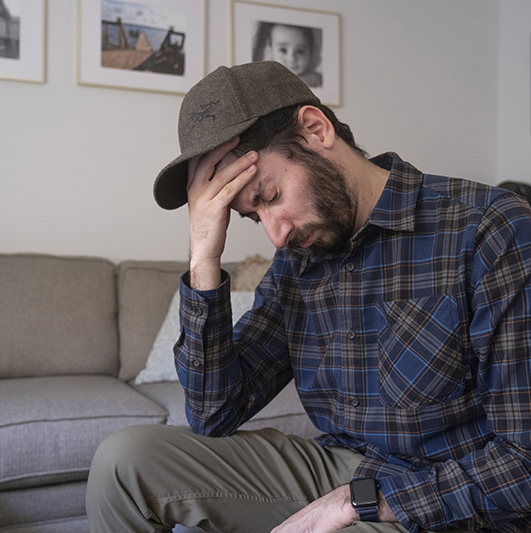Minimally Invasive Procedure Saves Diver’s Spine

June 06, 2023
Tarrin Gilliland has always been afraid of heights. But that hasn’t stopped her from competing in platform diving—where she spins, twists and somersaults into pools from a three-story perch—and becoming a standout in her sport.
“This has challenged me to face many fears in my life,” says the 20-year-old junior at Indiana University, a two-time NCAA collegiate champion. “I’m not really a risk-taker, but through diving, I can express myself in a totally different way. I love the thrill of it.”
The young woman’s fortitude was put to the test when she suffered a serious back injury that threatened to derail her diving career, including plans to compete in the Olympic Trials to represent Team USA in the 2024 Olympics in Paris. A day after weight-lifting in spring 2022—part of a rigorous training regimen she has maintained since age 8—Tarrin woke up in extreme pain. A large herniated disc compressing a nerve in her lower spine proved so debilitating that she couldn’t dive, or even sit or stand for very long.
Told she would need potentially career-ending back surgery to repair the problem, Tarrin came to the Neuroscience Institute at JFK University Medical Center for minimally invasive treatment—performed, ironically, by a former Olympic swimmer—that successfully flipped the script.
Precision Treatment for Back Injury
After Tarrin’s injury, she underwent treatment in Indiana that involved corticosteroid injections in the area around her spine. But they didn’t work, leaving her crestfallen and unable to continue training. Doctors there told her surgery was her only other option, but her diving coach hatched another plan.
One of her coaches had long ago competed against Ronald Karnaugh, M.D., who specializes in pain medicine, physical medicine and rehabilitation, spine intervention and sports medicine at JFK and represented Team USA as a swimmer in the 1992 Summer Olympics in Barcelona. Might Dr. Karnaugh be able to salvage Tarrin’s Olympic dreams?
The answer was yes. After evaluating Tarrin’s situation, Dr. Karnaugh proposed injecting corticosteroids into specific areas near her spine. The treatment, though similar to what Tarrin underwent in Indiana, differed in crucial ways—and avoided surgery.

“I knew the injections had to be done in an area that was more precise and consistent with where the nerve was irritated and inflamed from the large disc herniation,” Dr. Karnaugh explains. “The last thing you want is major surgery on a diver, who relies on the flexibility and mobility of her spine. In all likelihood, her career as a world-class diver would have ended.”
Delivering a Personal Touch
The night after the complication-free procedure in January 2023, Dr. Karnaugh hosted Tarrin and her boyfriend at his home. There, the father of three girls—all competitive swimmers themselves—was able to impart some unique perspective about overcoming adversity.
Dr. Karnaugh’s father suffered a fatal heart attack at the 1992 Olympics opening ceremony, after which his son—originally predicted to win at least a silver medal—placed sixth in the 200-meter individual medley final.
“I shared with her that personal tragedy had also set me back as an athlete on a world-stage level at the biggest moment of my life,” he recalls. “I shared how I was able to cope and get through it, and how it made me the stronger person I am today.”
Tarrin drew inspiration from her doctor’s show of compassion and trust. “Other people didn’t understand the goals I wanted to achieve,” she says, “but knowing that Dr. Karnaugh had that mindset made me trust him that much more.”
Her confidence in him paid off. Tarrin is virtually pain-free, back in the pool and laser-focused on her Olympic ambitions. She may need follow-up corticosteroid injections, but not if her recovery continues as expected. “My whole diving career was on the line, and it’s liberating being back in the water doing something I didn’t think I’d be able to do again,” she says.
Adds Dr. Karnaugh: “It’s awesome. It was so meaningful that I was able to help save her career and help make her dreams come true.”
Next Steps & Resources:
- Meet our sources: Ronald Karnaugh, M.D.
- Learn more about Spine care at JFK University Medical Center.
- To make an appointment with an orthopedic specialist near you, call 800-822-8905 or visit our website.
The material provided through HealthU is intended to be used as general information only and should not replace the advice of your physician. Always consult your physician for individual care.






